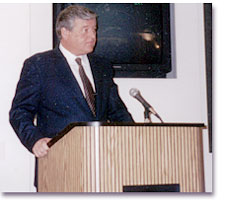|
John Wren and Omnicom made spectacles of themselves by holding
the OMC annual stockholders meeting in a room in its BBDO
unit in Atlanta.
The attendance of 24 was far below the 160 that smaller ad
conglomerate Interpublic faced the week before at a public
auditorium in New York.
A half dozen irate stockholders raked IPG execs over the
coals and the New York Times devoted 15 inches of type
to this shellacking.
Omnicom, by fleeing to Atlanta, escaped any notice by the
Times, Advertising Age, AdWeek or even
the local Atlanta Journal-Constitution.
The sole reporter at the OMC meeting was a free-lancer hired
by this website. The freelancer walked into the meeting room
without any requests for identification, which says a lot
about the security at BBDO.
Only when the freelancer asked some questions was identity
demanded. A BBDO staffer asked to see the driver's license
of the freelancer. The writer held an OMC proxy supplied by
The O'Dwyer Co.
When the freelancer tried to ask additional questions, having
received only minimal replies, the freelancer was told that
the meeting was over and was escorted out of the room to the
elevators.
This openly hostile treatment of the press, including the
refusal to discuss complicated financial matters, stands on
its head every known principle of PR, starting with "face
the bad news and get over it."
IPG, whose stock has
plummeted from a high of $57 in late 2001 to around $14,
where it has been for many months, has more negative issues
than OMC. These include reporting $181M in non-existing revenues;
paying $41M in bonuses to nearly 4,000 employees in 2003;
the potential $32M retirement package for former CEO John
Dooner, and its refusal to identify more than 200 acquisitions.
It added six new ones in Q4 of 2003.
OMC has plenty of negative issues itself. Its stock is still
27 points below its high of late 2001 and it is continuing
on its acquisition rampage in spite of pleas by analysts to
stop this.
It spent $472M on acquisitions in 2003, off from its usual
pace of $800M+. Its debt is $2.59B.
OMC reported a 3.7% gain in PR revenues to $955M in 2003
but no one knows where it gets this figure. A lot of the gain
could be PR firms purchased as part of the $472M spent on
acquisitions.
The main complaint of the Wall Street Journal article
that knocked the stock in half in June 2002 was that OMC makes
so many acquisitions that it's impossible to track its organic
growth. Its $5.88 billion in "goodwill," up $1B
in a single year, begs an explanation. Class action stockholder
suits continue against OMC because of insider stock sales
that preceded the huge stock decline two years ago.

John Wren, at a past
annual meeting when photographs were allowed. |
Wren was asked about
employment at the OMC PR units including Fleishman-Hillard,
Ketchum, Porter Novelli and Brodeur. He said he had no knowledge
of this and that decisions to employ or not to employ are
made by each unit.
His attitude has been that the agencies in the 1,500-member
family of OMC companies are independent and basically go their
own way as long as they meet certain goals.
This is not true at all. When push comes to shove it's the
parent who does the shoving. Evidence is the refusal of OMC
to let its PR units announce their fee incomes and staff counts.
This is a potentially ruinous decision for the PR firms by
the ad conglomerates. Advertising Age and AdWeek can track
billings of ad agencies by counting ad linage and commercial
time. But there is no such way to measure the output of PR
firms.
PR Week/U.K.
is so mad at this situation that it called the conglomerates
"cowards" in its May 7 issue (page 7).
It used this phrase under a picture of U.K. counselor Nick
Keable, who had sent in a letter-to-the-editor criticizing
the congloms for withholding data.
In running its table of 150 PR firms, PRW noted that "Once
again," the PR firms owned by OMC, IPG, Havas, Grey and
Publicis "have not been allowed to report any figures."
This makes it hard for PRW to report who is doing well and
who is not, something clients want to know. Even writing about
the PR firms is hard because key statistics are lacking. Trying
to profile the leading firms in specialties such as finance,
technology or beauty/fashion becomes impossible. This is bound
to cut into PRW's ad revenues.
The ad conglomerates'
motives in buying PR firms have never been clearer.
IPG is now combining seven Los Angeles units into 145,000
sq. ft. in one building. Tenants will be Weber Shandwick,
Rogers & Cowan, PMK/HBH, Bragman Nyman Cafarelli and event,
marketing and direct response units.
The holding companies want PR and other units to push each
other's services. IPG this year named a "chief collaboration
officer" to help ensure this.
The ad owners of the PR firms have no idea how hurtful it
is for the PR firms to be unable to release any of their vital
statistics. The ad people don t understand that honesty and
openness are what defines PR to the press, public and prospective
clients. Under the whip of their new owners, many of the big
firms only publish a small portion of their clients. Who can
trust a PR firm that is a house of secrets?
|
